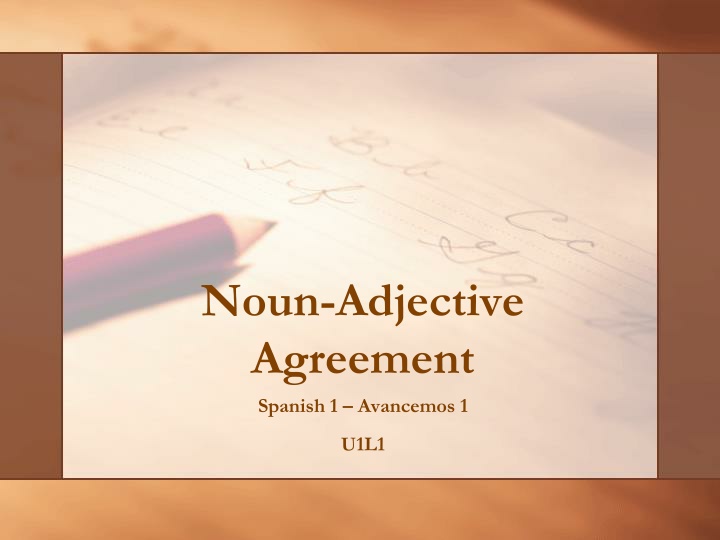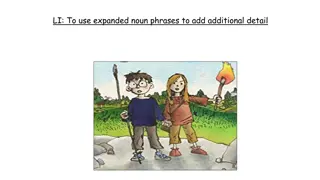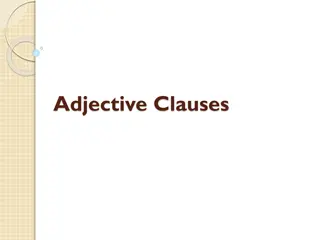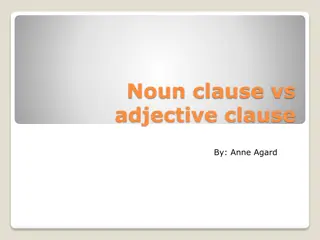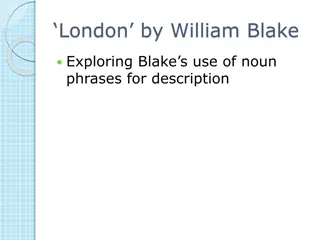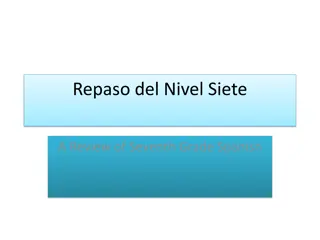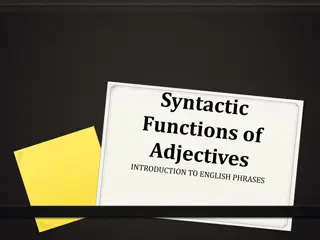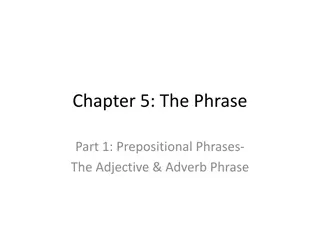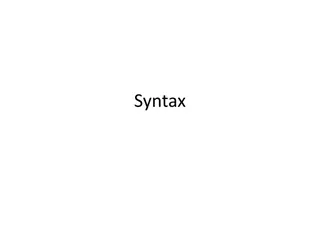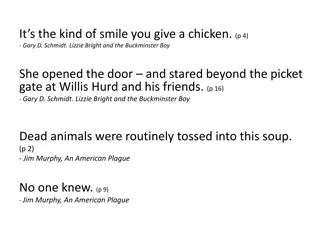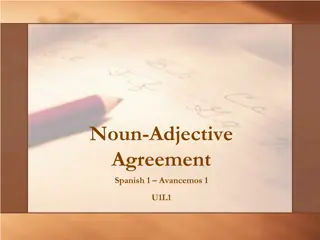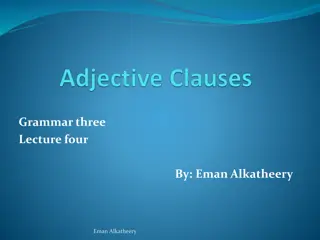Noun-Adjective Agreement
The rules of noun-adjective agreement in Spanish, where articles, nouns, and adjectives must match in gender and number. Learn about forming adjectives in masculine/feminine singular/plural, placement in sentences, and exceptions. Practice creating adjective forms with examples.
Download Presentation

Please find below an Image/Link to download the presentation.
The content on the website is provided AS IS for your information and personal use only. It may not be sold, licensed, or shared on other websites without obtaining consent from the author.If you encounter any issues during the download, it is possible that the publisher has removed the file from their server.
You are allowed to download the files provided on this website for personal or commercial use, subject to the condition that they are used lawfully. All files are the property of their respective owners.
The content on the website is provided AS IS for your information and personal use only. It may not be sold, licensed, or shared on other websites without obtaining consent from the author.
E N D
Presentation Transcript
Noun-Adjective Agreement Spanish 1 Avancemos 1 U1L1
Agreement Definition A grammatical concept in Spanish that requires certain parts of a sentence, mostly but not restricted to articles, nouns, and adjectives, to match in gender and/or number.
Article-Noun-Adjective Agreement Characteristics In Spanish, articles and adjectives match the gender (masculine/feminine) and the number (singular/plural) of the nouns they describe (just like definite/indefinite articles). So, every adjective has four forms (singular/masculine, singular/feminine/plural masculine/plural feminine); just like definite/indefinite articles Unlike English, in Spanish the adjective goes BEHIND the noun, but the article always before the noun. Example: The big school = La escuela grande
Noun-Adjective Agreement Most Spanish adjectives end in o. To make them feminine, change the o to an a. To make them plural, add s.
Noun-Adjective Agreement Fill in the following chart with the correct forms of the adjectives: Masculine Singular Feminine Singular Masculine Plural Feminine Plural bueno buena buenos buenas perezoso perezosa perezosos perezosas simp tico simp tica simp ticos simp ticas organizado organizada organizados organizadas
Noun-Adjective Agreement Some adjectives end in e and match both genders (you don t change it for masc/fem). To make them plural, add s. Masculine singular Feminine singular Masculine plural Feminine plural inteligente inteligente inteligentes inteligentes
Noun-Adjective Agreement Some adjectives end in a consonant and match both genders (you don t change it for masc/fem). To make them plural, you add es. Masculine singular Feminine singular Masculine plural Feminine plural joven joven j venes j venes
Noun-Adjective Agreement Some adjectives end in an R and can be made feminine by adding the letter a to the end. Masculine singular Feminine singular Masculine plural Feminine plural trabajador trabajadora trabajadores trabajadoras
Prctica: Translate the following expressions into Spanish: 1. The good-looking girl 1. La chica guapa. 2. The serious students 2. Los estudiantes serios. 3. The good schools 3. Las escuelas buenas. 4. The nice man 4. El hombre simp tico. 5. The tall woman 5. La mujer alta.
Ms Practica: Identify the gender and number of each description below with m/f for gender and s/p for number: 1. El hombre guapo. 2. Las chicas atl ticas. 3. Las mujeres art sticas. 4. Los chicos organizados. 5. La chica alta. 6. La estudiante pelirroja. 7. La persona mala. 8. Las chicas bonitas. 9. Los estudiantes simp ticos. 10. El hombre viejo.
Ms Practica: Translate the following expressions into Spanish: 1. The funny men. 1. Los hombres c micos. 2. The disorganized student (m). 2. El estudiante desorganizado. 3. The lazy girls. 3. Las chicas perezosas. 4. The serious boy. 4. El chico serio. 5. The short woman. 5. La mujer baja. 6. The blonde boys. 6. Los chicos rubios. 7. The big schools. 7. Las escuelas grandes. 8. The young friends (m&f). 8. Los amigos j venes. 9. The small girl. 9. La chica peque a. 10. The young boy. 10. El chico joven.
